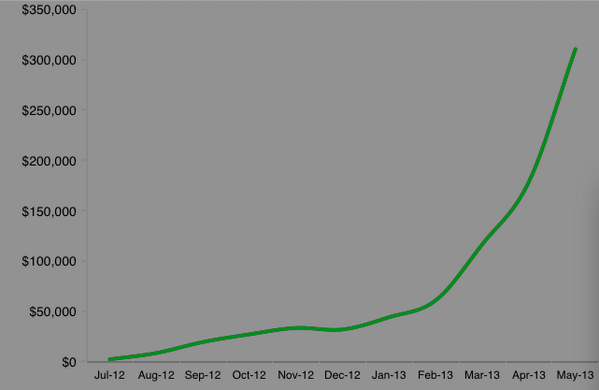
Scale Damn It, Scale!
Making money and building wealth are elusive concepts for the majority of the population. In most cases the reason is a flawed mindset which is translated into suboptimal actions that eventually leads to poor long term decisions.
We have already discussed what wealth is all about, and exposed the ugly truth about making money. In your journey to wealth, one of the most important concepts that you need to understand is that of scale.
Want to get this article as a nice PDF ebook? Download it below!
Ultimately, almost nothing is more important than scale
What does “scale” means? There are many approaches with which scale can be explained, but for our purposes I would like to use the following one:
“When we start a venture that appears to be viable, and then we consistently build upon it in order to capitalize on our existing success and expand it even more, at some point in the future we hit scale.”
This appears simplistic, but will be enough for our purposes. The concept is similar to growth, which is beautifully explained by Paul Graham’s relevant essay, and it provides a means for compounding your net worth.
Behind every successful venture lies a form of scale.
I would even go further and claim that it is a prerequisite in order to achieve a significant financial success.
As you understand:
No scale, no party!
Note to the technical geeks that might be reading. I am not talking about technical scale here, but rather business scale. Of course in many cases, especially tech startups, scaling technically is mandatory in order to scale the whole business.
Let’s now mention some examples of scale.
The Internet world offers the most prominent examples of scale, due to its innate nature. A website for example scales by attracting more and more visitors and increasing its mailing list.
In the mobile world, a social app scales by attracting more and more users, exploding its user base.
And in the brick and mortar world, a fast food business scales by opening more stores under its brand (either self-owned or under a franchise based schema).
2 Types of Scaling – Guess what they are?
There are basically two types of scale: Vertical and Horizontal.
Let’s discuss in detail what each one of those entails.
Vertical Scaling: This is achieved when we work on and invest (time/effort/money) in a specific venture or asset, building a powerful system one brick at a time. This works similarly to a snowball by having an initial state of small significance and building upon itself, eventually becoming larger and greater (snowball effect).
When we launch a new website and pour our sweat equity on it by adding more content, promoting it over the web, making it more efficient and finally monetizing it, we are engaging in a form of vertical scaling.
Horizontal Scaling: This type of scaling is essentially related to replication. When we have found an approach, an angle or a process that is working successfully, then we can copy, clone, transfer or adapt that to another niche or industry. Since we have internalized the basic principles that led to the initial success, we can now replicate our success there too.
When we have successfully built an authority site in a specific niche, acquiring the necessary experience along the way, it is then usually quite straightforward to leverage the same infrastructure, strategy and building process in order to create another authority site to a different niche. This is horizontal scaling that we are talking about.
Note that the two types of scaling are often intertwined in a venture, and at any given moment it is quite possible that both of them are manifesting (though usually one of them is more prominent).
For a typical successful entrepreneur, the most common path is to achieve significant vertical scale for his venture in a specific niche or industry, and after that reaches a climax (by dominating the space, performing a business exit etc.), he can revert to horizontal scaling by repeating his successful approach in another space, replicating success in that way.

Great examples of scale in real life
Let’s see some real life examples from the news in order to better understand the different types of scaling.
Real life example #1
The founder of Lululemon (Ticker: LULU, Market Cap ~7B), a designer and retailer of technical athletic apparel, after building his company for more than 15 years (vertical scaling), he recently stepped down from the company, cashing out on his long term success.
The main reason for that is that he is going to work on his wife’s company which is… (drums please)… also a clothing company! Time for horizontal scaling!
Real life example #2
The founders of the fast food chain Pret a Manger, a private company with over 400 stores most of them in London, after achieving great growth and scale, sold most of their equity in the business making themselves a fortune.
One of the founders, after his successful exit, went on to create his very own restaurant chain, named Itsu. Replication of success, horizontal scaling!
As a side note: What do you notice?
These guys at the top, never stop!
As great businessman Felix Dennis has admitted:
“Making money is certainly the one addiction I cannot shake.”
– Felix Dennis
The “problem” with scale is that it follows exponential path
One of the hardest “issues” with scale is that it inherently follows an exponential line. A real life example of a company’s scale is this:

What does that practically mean? And where is the problem?
The “problem” originates from the fact that the results at the beginning will be poor, certainly not life changing as they would be at the end of the line. The business or venture might struggle at its early steps, until everything fits and it hits the growth button.
The problem is that most people stop marching forward before the actual compounding of their efforts takes place! A guy starts working on a project, allocating time and energy on a specific path, dealing in most cases with a huge learning curve, and then, since he only sees petty early results, he stops his efforts and declares defeat.
This is so wrong and depressing at the same time. You have to battle through until you reach point where your venture gains traction! After that, it will be significantly easier on an emotional level to keep going.
I will mention this again because it is major:
Don’t stop hustling before compounding kicks in!
The reason for this “stagnation” might vary: lack of excitement from the non-sexy results, getting comfortable with only a mediocre outcome, living the #YOLO life etc. The end result is the same though: this guy will never hit the tipping point that will bring him explosive growth and perhaps change his life.
Now, please note that I am referring to situations where the entrepreneurial path someone marches on is indeed viable, and not a random effort. This might be harder than it sounds. Billy at Forever Jobless has a great post on this titled EV Millionaire’s Math, explaining the thought process that someone should employ before starting a venture.
I got it. Scale kicks ass. How do I do it?
Let’s get more practical and see how scale can be reached.
When you start a new venture or run a new business unit that seems to have some success and gets some initial traction (business model is validated, cashflow is positive etc.), you will probably notice that after a while it gets harder and harder to sustain the growth on your own.
The reason is that we are finite beings (finite time and energy), so we are not physically able to hit significant growth on our own. What we need then, is to leverage the appropriate system that will multiply our efforts.
What we are then supposed to do when we become the bottleneck of our own business?
Ground zero is to improve our personal efficiency. Effectiveness (doing the right things) is of course more important than efficiency (doing things right), but I suppose here that this part of the equation is covered.
Efficiency can be improved by establishing specific processes, using checklists to avoid mistakes, utilizing more and better tools etc.
Unfortunately, personal efficiency will soon hit a ceiling and won’t be enough to move the needle. We will have to introduce more impactful measures.
A personal favorite is automation. Automating some of the business processes, by using a certain technology or a tool for example, saves time, eliminates human mistakes and paves the way for achieving mass outcomes.
There is a tool for (almost) everything. Find it and use it.
Another weapon in our arsenal that needs to be considered is that of delegation. Depending on the niche/industry, this should be reserved as a last solution. The reason is that the introduction of the human element in the equation usually increases the complexity of the system, while bringing certain liabilities that did not exist.
However, as long as someone can delay it, it is almost deterministically certain that, at some point, bringing other people in the system will be required. Ideally, you should plan that beforehand so that everything goes as smooth as possible.
We could say that the two concepts above, automation and delegation, fall under the umbrella of “Process Creation”. I refer to higher level processes that might include multiple tools, human labor, etc.
In order to achieve significant growth and scale, everything in your business system should follow some explicitly defined process, otherwise unfortunate results will occur.
Building the foundation of our business on the pillars of efficiency, automation, delegation and defined processes, we can really streamline it and pave the way to scale.

My venture does not scale. What should I do?
Are you sure it cannot scale?
Have you tried to improve your internal processes? To automate some of the manually perform tasks? Don’t be a cheapskate, buy the damn tool.
Have you experimented with outsourcing some work to a freelancer or delegating it to an employee? The goal is to free you off the low-yield tasks so that you can focus on the most important ones, those that will actually grow your business.
There are a number of steps that can be taken in order to facilitate scale. But sometimes, even those are not enough.
I have tried everything but this shit does not scale. What now?
So, you are in the dreaded position to be in a venture that does not seem to scale. You have tried all the approaches, but nothing seems to be working.
Well, guess what? Not all businesses scalable.
Let me say that again, in case you missed it.
Not all businesses are scalable!
The ones that are not, are usually jobs disguised as businesses.
Let’s take as an example the owner of a kiosk (a small mini-market), which are very popular in my home country. A kiosk has limited to non-existent scale due to its locality (it can only serve people in a small area) and its limited capacity (it cannot serve an enormous amount of customers, even if those existed).
If you decide to become a kiosk owner, you should know that your scale is capped. The only way to get out of this limitation is to replicate the business unit by opening several kiosks.
That would also be an uphill battle. The low revenue that a single kiosk would bring (accompanied by the low profit margins), would not permit the accumulation of the capital necessary for a rapid expansion.
Does this mean you cannot make a decent living by being a kiosk owner? Of course not. But you should realize that this approach will never allow you to build high net worth.
The reason is that in order to building wealth and making money is directly related to the amount of value you provide to society. You have to impact millions to make millions!
Summing up, what do we conclude from this example?
Businesses should be scalable in order to help us build net worth.

Scale NOW… or suffer the consequences
It should be understandable by now that the concept of scale is extremely important in our business decisions. In fact, it should be used as a test to determine if a specific business idea should be acted upon or not.
Sadly, from conversations I have had with some aspiring entrepreneurs and people that are making their first steps in the business world, I have noticed that they are often making the mistake of not pursuing scale. Of course this is more often than not happening due to a subconscious decision of theirs, rather than a calculated one, but ultimately they end up with mediocre results either way.
What I have seen is that when someone accomplishes a bit of success, instead of going all in, he prefers the safety of complacency, he is not interested in committing the extra hours that will give him an edge or he is frustrated that he is not a millionaire yet after a few months of effort. He will then shift his focus to a different, more “shiny” project, or even worse, give up all hope.
Let me provide some real life cases that highlight the problem at hand.
Category #1 – e-Bay sellers / e-Commerce players
Sam Seller is active in the e-commerce space. This guy has read a ton of material in order to understand how this chaotic platform (e-Bay) works, he has committed time and effort to find a product in a non-saturated market, and has made a simple process that works end-to-end, finally bringing in some cash-flow. Awesome!
And then what he does, is that he rests on this minor success, he chills and lets life go on. After all, it is hard to find another niche, right? The first one took months! Sam will not launch his own e-shop, because his “developer” friend is still working on it, and hey, it is already May, summer is approaching fast.
Surreal.
I have seriously witnessed such behaviour and every single time I get befuddled.
Guess what Sam! It is time to scale. Finish up your private e-shop which will allow you to have some decent profit margins and avoid the killer e-Bay and Paypal commissions (vertical scaling), start building your own subscriber mailing list, so that you have recurring customers and can perform some upselling and cross-selling (vertical scaling), and finally, after this has been optimized, try exploring new niches and trading new products (horizontal scaling).
Category #2 – Amazon Kindle Publishers
Now let’s meet Pete Publisher. This guy has spent hours upon hours reading books and articles, and watching video courses on how to get an edge on the Kindle market. He has joined 12,467 groups on Facebook, where he asks for reviews exchange and submits his books.
And instead of creating a team of freelancers (with a hierarchical structure, of course) that will assist him create a “book generator” in an efficient way, Pete just rests on his 2 titles, because, hey, publishing for Kindle is hard.
Are you serious Pete?
Now it is the time to scale! You know how the process works. Create a production line that will push out titles back to back. What are you waiting for? For Amazon marketplace to get even more saturated? How long do you think the party will last?
There are obviously more categories that we could talk about, but these are the two most obvious, and at the same time those with the most immediate potential (exactly because these guys have already almost finished the initial part of the exponential curve we talked about earlier).
Seriously, scale NOW… things are getting harder
And let’s discuss some even more depressing stuff.
I believe it should be obvious that, from a biological standpoint, the best time period for someone to work on building his skillset and, as a result, increase his net worth, is the one during his twenties (20-30). In some cases, the next decade (30-40) could also work for some individuals, assuming they have followed a healthy lifestyle, and their energy levels are in good place.
After that, if the foundation has not already been built, then sorry folks, the game is over. Unless someone things that at his 50s he will be able to write code or promote Kindle books on Facebook.
Ten years should be more than enough to hit a million dollars net worth status.
The Wall Street Playboys have done an excellent job outlining a step-by-step plan on how to make it, and I have also described how to do it by leveraging the online world.
On top of the above, the long-term mega-trends look ominous for the majority of the population (pension system/social security getting annihilated, large scale automation coming, globalization spreading rapidly etc.). Even more reasons that timing is critical.

Conclusion
Scale is an inherent trait that every business venture you start should have. Provided that you want to build significant wealth, that is.
During your first steps, when you obtain precious experience and educate yourself, you will usually scale vertically basing your growth initially on your sweat equity and then on a fine-tuned system.
After you have achieved significant success with one of those ventures, you may choose to also scale horizontally with another similar project, depending on what your end game is.
Make sure to always check if your decisions are aligned with a long term plan to scale your business and ensure you don’t get complacent or settle for mediocre results.
Closing, remember that scale never occurs by chance, it is always the product of careful design.
“Growth is never by mere chance; it is the result of forces working together.”
– James Cash Penney, Founder of JCPenney




